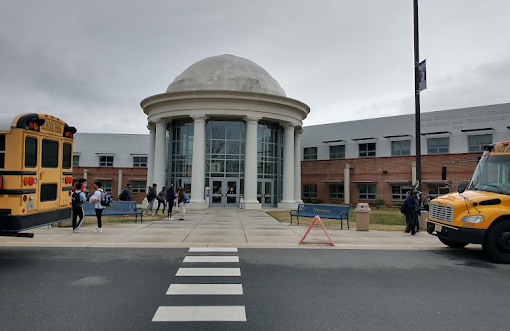How admissions legislation went wrong

Jefferson students walk to the buses after a long day of school. Due to U.S. District Judge Claude Hilton’s ruling on the new Jefferson admissions process, it is uncertain how new students will be selected to join Jefferson.
March 25, 2022
On Dec. 17, 2020, the FCPS school board overhauled the Jefferson admissions system, shifting policy to re-emphasize the importance of offering admission to disadvantaged students and students in under-represented schools.
The debate surrounding the adoption of these changes at the Dec. 17, 2020, FCPS school board meeting served as a prime example of the tensions surrounding the admissions process. All sides presented strongly-worded statements, with some arguing that the changes were illegal while others argued the changes weren’t enough.
“Tonight, you are about to destroy TJ,” Coalition for TJ cofounder Asra Nomani said, opposing changes to the admissions system during the Dec. 17 school board meeting.
“The increasingly holistic admissions process has not helped [enough],” Paul Thomas, a former Jefferson staff member, said, advocating for a merit lottery system.
Taking the middle ground, the FCPS school board opted for an approach that angered individuals on all sides: a “holistic admissions system” that involves several major changes from prior years, such as adding automatic admissions offers to students whose grades place in the top 1.5% at their middle school and removing teacher recommendations from the admissions process.
The changes to the admission system did not destroy Jefferson, but the tone and tactics employed by both sides in the ensuing debates have inflicted their own form of devastation on the school and community.
Months of lawsuits, vitriol, and accusations of racism have deepened divides and complicated the task of rebuilding unity in the aftermath of the changes. On Feb. 22, the new admissions process was ruled illegal by U.S. District Judge Claude Hilton, who cited its disparate racial impact as grounds for his ruling. Current FCPS appeals to sustain the system have been struck down.
The FCPS school board believes the new system satisfies the law and that its holistic approach considers a range of factors in determining whether students qualify for admission. Regardless of the merits of the new system, as long as parents are angry enough to sue our schools, the divisions will remain.
Government actions on this issue display a fundamental problem with community outreach in our democratic systems. Instead of operating a process that brought both sides closer together, the school board largely pushed past critics on its way to a decision. Unfortunately, actions like this are encouraged by the limitations of our current parent advocacy system.
Any critiques of a highly complex admissions process had to fit into the 3-minute window provided for public comment. That’s not a thoughtful system designed for constructive parent advocacy. That’s a system designed to reduce the burden of time upon administrators rather than facilitating the hard work and discussions necessary to forge a mutually acceptable solution.
I sympathize with a desire for shorter meetings, but any civil servant’s job involves sacrificing time in order to find the best solutions for the community. The failure on the part of the FCPS School Board and parents to engage constructively has led to a situation in which lawsuits have replaced civil discussion.
Whether or not you support the holistic admissions process, it sets a poor precedent for our community’s ability to fashion lasting solutions embraced by stakeholders with different political ideologies. Democratic systems of government can only function when people engage with each other civilly. When people lose confidence in the ability of polite dialogue to generate policy outcomes, that dialogue gets a lot less polite.
Due to the new court rulings against the system, the FCPS school board will likely have to reopen the debate on the admissions process once again. This time, the school board and those on all sides of the debate should work to create an environment where members of the Jefferson community can discuss these issues respectfully and civilly without filing court orders. Parties should negotiate in good faith and avoid another year in divisive arguments that damage the very community our school is supposed to serve. Let’s do better.








